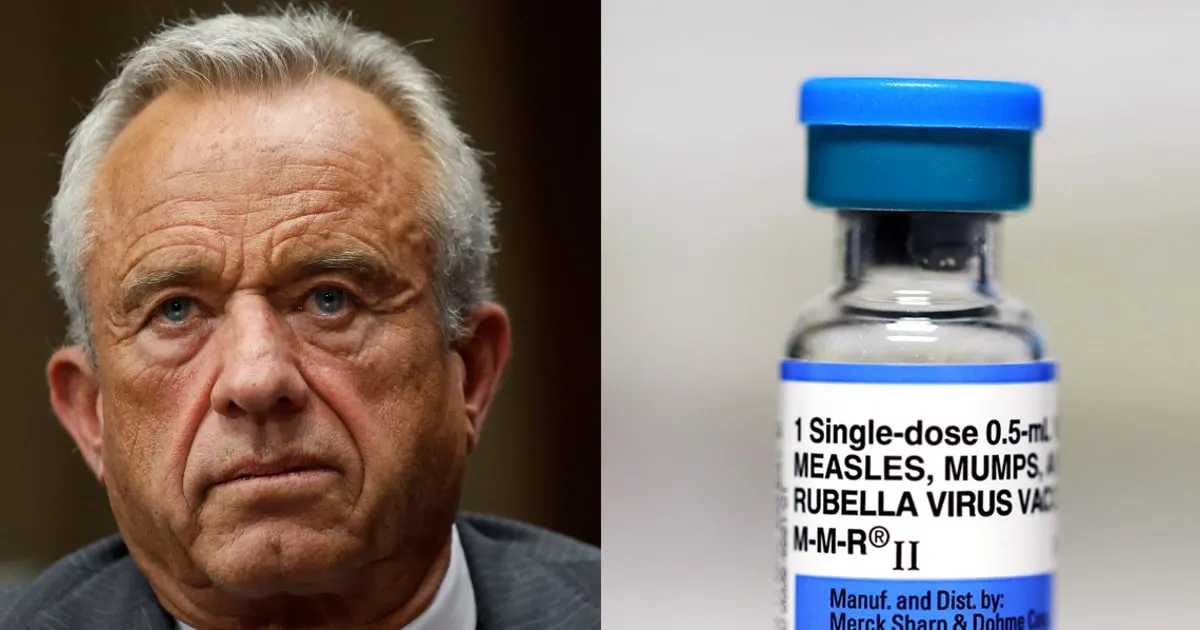
In a recent interview, Health and Human Services Secretary Robert F. Kennedy Jr. urged the public to receive the measles vaccine, simultaneously making claims that the vaccine has not undergone thorough safety testing and that its protection may be short-lived. Kennedy, known for his anti-vaccine stance, now oversees crucial federal health agencies, including the Food and Drug Administration (FDA) and the Centers for Disease Control and Prevention (CDC). However, he refrained from offering a strong endorsement for measles vaccinations, instead stating that the vaccine is the “most effective way” to prevent the spread of the virus.
In his interview with CBS News, Kennedy suggested that the Trump administration focused on developing treatments for individuals opting out of vaccination. However, experts point out that there are currently no approved treatments for measles, which can be fatal, killing nearly 3 out of every 1,000 diagnosed cases. His approach has drawn criticism from many medical professionals, who argue that emphasizing unproven treatments and framing vaccination as merely a personal choice panders to his anti-vaccine supporters.
Kennedy also asserted that measles cases in the United States are inevitable due to diminishing immunity from the vaccine, a statement that many doctors contest as inaccurate. Dr. Paul Offit, director of the Vaccine Education Center at Children’s Hospital of Philadelphia, clarified that two doses of the measles, mumps, and rubella (MMR) vaccine provide lifelong protection. He explained that the vaccine triggers the production of memory cells capable of recognizing the virus throughout a person’s life. “We eliminated measles from this country. That could never happen if immunity waned,” Offit stated.
Since before 2000, measles has not been a constant presence in the United States. The disease is typically reintroduced by international travelers and can spread among communities with low vaccination rates. Kennedy emphasized that while he believes in promoting the measles vaccine, he does not support government mandates. It is important to note that while the federal government does not mandate childhood vaccines, all 50 states require them for children attending public schools.
According to the National Conference of State Legislatures, all states have exemptions for medical reasons, and most states offer additional exemptions based on personal beliefs, including religious objections. The ongoing measles outbreak in the United States has been primarily driven by transmission within a Mennonite community in Gaines County, Texas, where vaccine hesitancy is prevalent. Since January, there have been a total of 668 measles cases, including tragic reports of two pediatric deaths.
Kennedy has pointed to higher measles case numbers in Europe as a justification for the United States' handling of the outbreak. However, the figures he cited—approximately 127,000 measles cases in Europe—reflect totals from the previous year across 53 countries, with low vaccination rates in southeastern Europe contributing significantly to the figures. Dr. William Moss from Johns Hopkins criticized Kennedy’s comparisons, stating, “We should be comparing measles in the United States this year to measles in the United States and prior years.”
With the current count of measles cases in the U.S. being the highest since 2019, concerns are growing that the nation may lose its measles elimination status as doubts about vaccine safety continue to spread. Kennedy claimed, “Right now we don’t know the risks of many of these products because they’re not safety tested.” However, Dr. Ofer Levy, director of the precision vaccines program at Boston Children’s Hospital, emphasized that vaccine development typically requires 10 to 20 years and that even after approval, various government surveillance systems monitor for adverse reactions.
Medical experts, including Dr. Offit, argue that Kennedy’s assertions about vaccine safety are misleading. Many childhood vaccines were indeed tested against placebos, contrary to his claims. A spokesperson for the Department of Health and Human Services acknowledged that Kennedy raised concerns about vaccine trial practices, including the use of active comparators instead of inert placebos.
Dr. Levy pointed out that while there is always room for more safety studies or long-term follow-ups, it is essential to recognize that childhood vaccines have successfully prevented severe diseases. In conclusion, medical professionals urge that while discussions about vaccine safety are valuable, it is crucial to rely on scientific evidence and uphold the importance of vaccination in protecting public health.